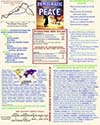[first published May 23, 2005] A Docudrama About Pol Pot’s Cambodian Communist Revolution. This is from Rummel” Book 1 alternative history Never Again Series (link here). Note that while the characters are fictitious, their experience is based on known facts and refugee reports. This is unbelievable enough without having to invent any of the horror.
***
April of 1975 was a happy day for Tor as she waited for Nguon beneath the torn awning on the ramshackle building where they lived.
The war was now over. After successive retreats, General Lon Nol could no longer even defend Phnom Penh, the capital of Cambodia, against the Khmer Rouge guerrillas. The Cambodian Army had declared a cease-fire and laid down its arms. Soon afterward, the government conceded defeat and opened Phnom Penh to the Khmer Rouge and their leader, Pol Pot. An army of 68,000 guerrillas achieved victory for a communist party of 14,000 members against an army of about 200,000 men.
Naturally petite, Tor was skinny from lack of food–a common problem in Phnom Penh at that time. Her face was still round, though–“Just,” Nguon always told her, “as I like it.” She had kept her black hair cut short to keep it out of the way as she worked in her cousin’s small restaurant. On this day, she wore an orange blouse and a beige sarong.
Nguon was teaching, but she was sure he had heard the news about the great victory. No doubt he would cancel class and join her to welcome the guerrilla soldiers. They were supposed to arrive within the hour.
Tor heard people celebrating all around her. Many intellectuals and middle-class Cambodians, disgusted with the everyday corruption of the government, were willing to try anything that brought change, even communism. Tor was no less happy. She was already thinking about bringing her own mother from the northeast, where she had been trapped by the war.
There Nguon was, all smiles as he approached her in his common black shorts. He took her hands and, looking into her eyes, said, “My dearest one. During all these years of war we prayed to Buddha for peace, and now it’s here. The world will change today. What a great moment.”
They walked to Sisowath Quay down which they expected the major force of Khmer Rouge to come on their way to the Royal palace. Many people were out on the streets, laughing, talking, all waiting. Almost every other building had white material–clothes, sheets, or towels–hung from windows or poles.
A low rumble grew into the mechanical roar of trucks. Everyone stopped whatever they were doing and looked toward the approaching noise.
Down Sisowath Quay came the Khmer Rouge. Those soldiers in the vanguard rode in trucks and vehicles of all descriptions. Behind those, squads of guerrilla soldiers walked in single file down the center of the street. They carried an assortment of weapons. No guerrilla seemed older than eighteen. All wore black, pajama-like uniforms, sandals made from strips of tires and inner tubes, and black Chinese caps. Each soldier had wound a red-checkered headscarf around his cap or neck. None of them smiled or looked at the crowds of people lining the roads.
Some of the people cheered and clapped, but most just smiled and waited to see what the victorious guerrillas would do next.
After watching for a while, Tor commented, “They are so young. How could they defeat the army?”
“Well, they did,” Nguon responded. “Let’s go back to our place. I’ve seen enough.”
Tor and Nguon ambled back to their apartment climbed the worn steps and walked down the dim, unpainted hallway to their room. Although almost too excited to eat, they thought it best to get something into their stomachs before what surely would be an evening of celebration. As they ate some reheated rice and fruit and a little leftover ham Tor had saved from the restaurant, they discussed what they would do once the city settled down.
Shots echoed out on the street as they were cleaning up. Tor and Nguon rushed over to the small window and peered out. They saw people moving past their building, their faces creased with confusion. They were looking around and glancing often over their shoulders. Waving their guns and yelling, several Khmer Rouge soldiers pointed in the direction the people were moving.
Tor gasped. “What’s going on? I thought the war was over.”
“I don’t know,” Nguon replied. “Maybe some Lon Nol soldiers don’t want it to end. I’m going out to take a look as soon as we finish here.”
But when they finished cleaning up a few minutes later, the noise from the street had increased greatly. Babies cried; car horns blared; people yelled constantly. Nguon and Tor exchanged an anxious glance. They decided to take a look outside, but when they reached the street they couldn’t believe their eyes.
A mass of people of all descriptions, packed almost shoulder-to-shoulder, moved in the direction the soldiers indicated. The crowd eddied around the spots where the guerrilla soldiers stood yelling like a stream around boulders. Here and there, a crowded car, small truck, or motor scooter crawled along in the flow of humanity. Tor glimpsed several motorbikes loaded down with possessions.
“Move, move. Get out,” the Khmer Rouge soldiers shouted, waving their rifles.
Standing on their steps, Tor looked up the road in the direction all these people were coming from, and saw a body lying on the walkway two buildings down. Another body lay a little further away. Everyone in the crowd avoided them. The bodies created little eddies of their own in the stream of people.
A black-clad soldier with a red scarf around his neck rushed up, pointed an AK-47 at them, and screeched in the high, thin rasp of a teenage boy, “You must leave this evil place. Go now!”
He couldn’t be over fifteen years old, Tor thought.
Nguon didn’t understand. “Go where? Why?”
“Go! Go! Out of the city. Now!” he screamed at them, even louder.
Tor was scared now. Her voice trembled when she asked, “But can’t we get something to take with us? It will take just a–”
Nguon grabbed her hand and jerked her off the steps. He pulled Tor down the side of the crowded road. They were jostled and pushed by people and bumped by the heavy suitcases a few people carried. A short distance down the crowded walkway, Nguon, who was tall for a Cambodian, looked back. Not seeing any soldiers nearby, he pulled Tor into an alley with him.
“What are you doing?” she asked between gulps of air. She’d begun to shake.
“Don’t say anything,” Nguon urged, putting his finger on her lips.
Still gripping her hand, he pulled her with him as he cautiously rushed down the narrow, trash-filled alley. When he came to an intersecting alley, he peeked around the corner.
“No soldiers,” he murmured, and turned the corner with Tor still in tow. Several old people milled around in the alley, asking about all the noise and what was going on. Nguon ignored them.
Within minutes they reached the rear of their building without seeing any soldiers. Obviously, the soldiers were stretched thin in trying to cover all the alleys, roads, and buildings in Phnom Penh. He guessed, however, that the soldiers would began to search these buildings soon.
A small step at a time, Nguon entered the building through the rear entrance, peering down the hallway to make sure there were no soldiers inside. He motioned for Tor to follow him, and they rushed to their room. The hallway was deserted–others had also gone out to investigate the noise in the street.
Once they were inside, Nguon allowed his own fear to show. Looking at Tor, he said quickly, “I think that kid was going to shoot us. I don’t understand it, but I think we should prepare for the worst and get away before they search the building.”
“Where are they sending us?”
“I don’t know, but hurry now, let’s pack what we might need. Pack food, of course, and blankets, clothes, and the money we’ve hidden.”
Tor walked to the corner of the room and pulled out from under a glass topped rattan table a large, battered French suitcase that had been in her family for two generations.
“No, no,” Nguon said, stopping her. “That’s too clumsy. Just two bags, one for each of us, and not too hard to carry.”
Tor fetched her wicker shopping bag from their small closet and Nguon picked up the school bag he used to carry books and papers, and they began to fill them. Just in case they lost a bag, they split the rice and fruit between them, and each took a small bottle of drinking water. They also divided between them their family heirlooms and their other few valuables. Tor kissed her old gold locket containing a photograph of her mother and father, then tucked it into the side of her bag where she wouldn’t accidentally pull it out. She also threw in a box of tissues.
Nguon looked around, stood thinking for a moment, and chided himself, “I almost forgot.” He took an old Cambodian tourist brochure from a drawer in their one cabinet, tore out the map inside, and put it in his bag.
He stepped over to the sink they had used for everything from washing dishes to their bodies, picked up an old Japanese chef’s knife and handed it to Tor. “Wrap this in some of your old clothes and hide it in the bottom of your bag,” he told her. He picked up a six-inch French carving knife, wrapped it, and deposited it in his own bag.
“Okay, let’s . . . ” Nguon trailed off as they heard more shots.
Tor rushed over to look out the window. “No, they can’t be doing this!” she exclaimed.
Here and there in the stream of people, invalids were being pushed in wheelchairs. Others staggered along on crutches. People pushed hospital beds with their loved ones still in them. Tor saw an intravenous tube stuck in the arm of one of the invalids. The tube was connected to a bottle hanging from a pole being wheeled along beside the bed by a woman who was probably a relative.
“The soldiers must also be emptying the hospitals,” Nguon said. “We can’t do anything about it. Let’s go.”
They hurried down the hallway and paused on the stairs to look both ways before plunging into the moving mass of people.
Books, articles, statistics



 Posted by rudyrummel
Posted by rudyrummel 






